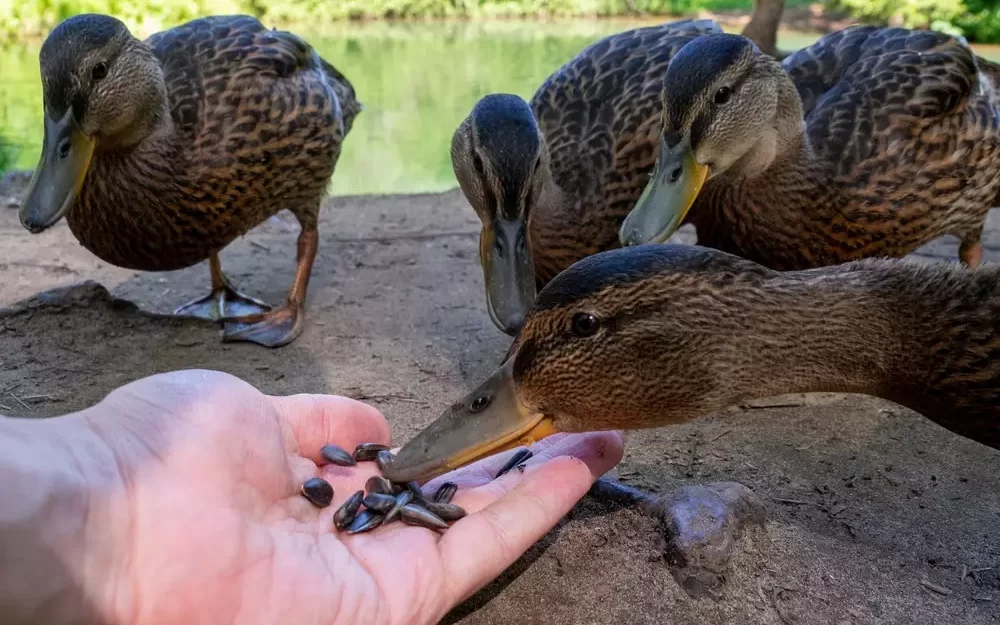Mallard ducks are one of the most common types of ducks in North America. They can be found in a variety of habitats, including ponds, lakes, and marshes. Mallards are omnivorous, which means they will eat a variety of food items.
Mallard ducks are one of the most common types of ducks in North America. They can be found in nearly every state and province, and they are a popular choice for many people who enjoy keeping ducks as pets.
While mallards are not particularly picky eaters, there are still some things that you should avoid feeding them.
In this comprehensive guide, we’ll explore the nutritional needs of mallard ducks, what foods you can feed them, and what to avoid. Let’s dive in!
Nutritional Needs of Mallard Ducks
Mallard ducks are omnivorous and require a well-balanced diet to maintain their overall health. In the wild, they naturally consume a variety of plants, insects, and small aquatic creatures.
A healthy diet for mallard ducks should provide essential nutrients, such as proteins, carbohydrates, vitamins, and minerals.
Natural Food Sources for Mallard Ducks
Mallard ducks typically feed on a wide range of natural food sources, including:
- Aquatic plants
- Seeds
- Insects
- Worms
- Snails
- Small fish
These natural food sources provide the ducks with the necessary nutrients to ensure their health and well-being.
Safe and Nutritious Foods to Feed Mallard Ducks
If you’re looking to supplement the diet of wild mallard ducks, or if you keep them as pets, consider providing the following types of food:
Vegetables
- Chopped lettuce
- Spinach
- Kale
- Peas
- Chopped carrots
- Chopped zucchini
Grains
- Cracked corn
- Barley
- Oats
- Brown rice
- Unsalted, air-popped popcorn
Protein Sources
- Earthworms
- Mealworms
- Insect larvae
- Small fish
Foods to Avoid
Avoid feeding mallard ducks the following foods, as they can be harmful to their health:
- Bread
- Chips
- Crackers
- Cakes
- Pastries
- Chocolate
- Avocado
- Onion
- Garlic
- Processed meats
- Alcoholic beverages

Why Bread is Harmful to Ducks
Bread is commonly fed to ducks, but it is actually harmful to their health. Bread provides little nutritional value and can cause a condition called “angel wing” in ducks.
This condition results in a deformity that prevents the duck from flying . Additionally, uneaten bread can lead to mold growth in the water, posing risks to the ducks and other aquatic life.
What Should You Feed Ducks Instead of Bread?
Ducks are often fed bread by well-meaning people, but this is actually not the best food for them.
Ducks need a diet that is high in protein and low in carbohydrates, and bread is mostly carbohydrates. Some of the best things to feed ducks include:
- Peas
- Corn
- Oats
- Mealworms
How to Feed Ducks Responsibly
When feeding mallard ducks, it’s important to follow these guidelines to ensure their well-being:
- Feed ducks in moderation – Overfeeding can lead to health issues and dependency on humans for food.
- Scatter food on the water or ground – Avoid feeding ducks by hand, as it may encourage aggression and discourage their natural foraging behavior.
- Keep the feeding area clean – Pick up any uneaten food and dispose of it properly to prevent pollution and the attraction of pests.
Supplementing the Diet of Domestic Mallard Ducks
If you have domestic mallard ducks, providing a well-balanced diet is essential for their health.
Consider supplementing their diet with specially-formulated duck feed, which contains the necessary nutrients in the right proportions.
Make sure to provide fresh water daily and clean their feeding area regularly to prevent the spread of disease.
Monitoring the Health of Mallard Ducks
Keep an eye on the overall health of the ducks you’re feeding. Look for signs of illness, such as lethargy, difficulty breathing, or loss of appetite.
If you notice any concerning symptoms, contact a wildlife rehabilitator or veterinarian for advice.
Feeding Mallard Ducklings
Mallard ducklings require a diet high in protein for proper growth and development. In the wild, they mainly consume insects and other small invertebrates.
If you’re caring for ducklings, provide them with a starter feed specifically formulated for ducklings, which contains the essential nutrients they need.
What Can I Feed a Wild Mallard Duck?
A wild mallard duck can be fed a variety of things, but the best option is to give them food that is similar to what they would eat in the wild. This includes things like insects, small fish, and plants.
You can also give them commercial duck food, but make sure that it is high in protein and low in fat.
FAQs
How often should I feed mallard ducks?
It’s best to feed mallard ducks sparingly and avoid creating a dependency on human-provided food. Aim to feed them once or twice a week, and remember to provide only healthy, nutritious options.
Can I feed mallard ducks bird seed?
Yes, birdseed can be a suitable food for mallard ducks, especially if it contains seeds from native plants. Choose a mix that is appropriate for ducks, and avoid mixes that contain added sugars or artificial preservatives.
Why do ducks need grit?
Grit, such as small stones or sand, aids in the digestion of food by grinding it down in the gizzard. Ducks naturally consume grit while foraging, but if you’re feeding domestic ducks, it’s important to provide a source of grit to ensure proper digestion.
Conclusion
Feeding mallard ducks can be a rewarding experience, but it’s crucial to provide them with a well-balanced, nutritious diet that meets their specific needs.
Avoid harmful foods like bread and opt for healthier options, such as vegetables, grains, and protein sources.
By following these guidelines and feeding ducks responsibly, you can contribute to their overall health and well-being.